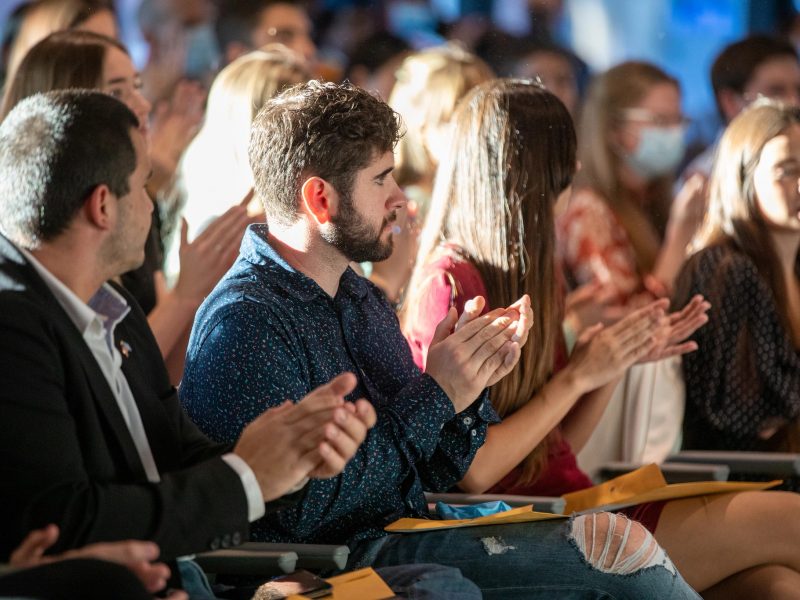Maxwell-Lutz community impact award
About this award
The Maxwell-Lutz Community Impact Award is an interdisciplinary research award jointly sponsored by the College of Social and Behavioral Sciences (SBS), the College of the Environment, Forestry, and Natural Sciences (CEFNS), and the College of Engineering, Informatics, and Applied Sciences (CEIAS). This award aims to support interdisciplinary collaboration and research to improve environmental sustainability and the health, well-being, and vitality of global communities and cultural systems. Up to $5,000 annually is awarded to one team or is shared by multiple teams.
2024 applications will be accepted through March 7, 2024.
Project proposal requirements
To be considered for funding, one or more faculty members may submit a project proposal, including:
- a substantive and verifiable community impact
- an interdisciplinary collaboration that includes faculty or students from the College of Social and Behavioral Sciences in coordination with faculty and students from the College of Engineering, Informatics, and Applied Sciences, and/or the College of the Environment, Forestry, and Natural Sciences
- participation of one or more undergraduate or graduate students
The proposal should address how the project effectively improves any two of the following:
- health and well-being of local and/or global communities
- vitality of community or cultural systems
- environmental sustainability
Preference will be given to proposals for projects that are interdisciplinary and cross-departmental.
Team members for the selected projects will be designated Maxwell-Lutz fellows.
How to apply
Submit your proposal with the following information in our online application form.
Project information
- Title
- Outline
- Description (300 words or less)
- Faculty leader(s) and contact information
- Top three goals of the project and how success will be measured
- If the project is standalone, describe its intended benefit for the intended community (200 words or less)
- If the project is intended to support another ongoing project or thesis, describe the project and how funds would make a significant difference to the success of the parent project and benefit the intended community (200 words or less)
Student information
- Role of students in the project
- Name, major, college, NAU user ID, and class year (freshman, sophomore, junior, senior, or graduate student) of students
- If the project supplements another project or thesis, the title of the project or thesis and the name of the principals and departments involved
Budget information
- Budget outline for the project, the total amount requested, justification, and a breakdown by categories. Allowable categories include student wage/graduate stipend (limited to 60% of the request), equipment, supplies, and travel
Review process
Proposals will be reviewed by a selection committee comprised of one representative from SBS, CEIAS, CEFNS, and a community member
Post-award process
- Students to present the results of the project and what they learned at an event or meeting—such as the Northern Arizona University Undergraduate Expo
- Faculty to prepare a post-project report that includes the outcomes of the community impact, if goals were met, and a complete list of expenditures
Past award recipients
2023: Envisioning a Permaculture-Based Community Farm at McAllister Ranch
Peter Friederici, SBS; Dr. Rosemary Logan, CEFNS; Ben Steller, BS Environmental & Sustainability Studies; Sufyan Suleman, MA Sustainable Communities
2022: Care for Nahádzáán for Engineers—Care for Mother Earth
Dr. Melanie Hildebrandt, SBS; Dr. Stefanie Kunze, SBS; Mark Lamer, CEIAS; Hannah Thelen, MS Civil Engineering Student
2021: Strong Roots: Planning and Building a Community Health Clinic in Mexicali, Baja California, Mexico
Paola Michel Silva, SBS; Leopoldo Beltran, CEIAS; Peter Friederici, SBS; Dr. Janine Schipper, SBS; Dr. John Tingerthal, CEIAS
2020: Identifying Challenges and Opportunities for Designing Culturally Relevant Behavioral Health Interventions for Hopi Youth
Shelby Hagermman, CEIAS; Simone Richardson, SBS; Dr. Alisse Ali-Joseph, SBS; Dr. Darold Joseph, COE; Dr. Morgan Vigil-Hayes, CEIAS
2019: Community-based waste management project in Chitete-Kasungu Municipality, Malawi
Joseph Amazuwa Chirwa, SBS; Dr. Dianne McDonnell, CEIAS
2018: Promoting Education and Elephants in a Rural Zambian Community
Kaitlyn Henry, CEFNS; Samantha Hershowitz, CEFNS; Tyler Tuengel, CEFNS; Nate Gordon, CEFNS; Railyn Stokes, SBS; Dr. Faith Walker, CEFNS; Dr. Carol Chambers, CEFNS; Dr. Alan Lew, SBS
2017: Prioritizing Ecological Restoration Sites for Educational Purposes
Adam Bringhurst, CEFNS; Samantha Dinning, SBS; Olivia Camping, SBS; Dr. Rand Decker, CEFNS; Dr. Wilbert Odem, CEFNS; Dr. James Bowie, SBS; Mark Manone, SBS
2016: PICES Project—Pilot Intervention of Culturally-Responsive Exercise System
Christopher Frank, CEFNS; Annalee Boyle, CEFNS; Jeff Morrison, CEFNS; Ashley Averett, SBS, Anna Harris, SBS; Dr. Sara Jarvis, CEFNS; Dr. Melissa Birkett, SBS
